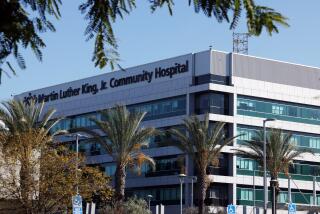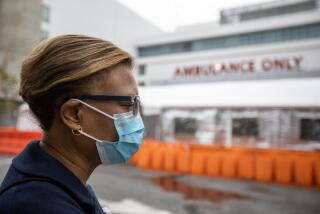Privatize King/Drew
- Share via
INCREDIBLY, THERE MAY STILL BE private firms interested in taking over the Martin Luther King Jr./Drew Medical Center, which last week learned that it failed its final inspection in August and stands to lose $200 million annually in federal funding. The county Board of Supervisors, which met Monday to discuss the center’s fate, should not miss this opportunity to bring its sorry mismanagement of the center to an end once and for all.
The county is left with few choices. It could close the center, although that would create more problems than it solves. It could turn it into a glorified clinic that handles only routine care, although that would leave the surrounding communities without sufficient access to emergency care. Or it could privatize King/Drew. This is by far the best choice.
King/Drew’s failure is as much a story about the board’s negligence as it is the hospital staff’s. For the last three years federal inspectors, county auditors and Times reporters have detailed a decades-long pattern of medical and administrative errors, many of them fatal, at King/Drew. Two years ago the board voted to close its trauma center and hired outside consultants to oversee King/Drew’s operations. Hundreds of its employees have been fired or disciplined.
Still, federal officials announced Friday that King/Drew had failed a national Medicare certification after serious lapses in medical care were found during a review in August. It didn’t meet minimum standards in nine of 23 areas -- a record even worse than before the recent reforms.
County officials have been in periodic talks for months with hospital chains about a possible privatization of King/Drew. But without assurances from the board that it has no plans to get involved in the management of King/Drew, these talks are likely to founder. There will be some difficult issues. Any private management firm would want control over the center’s civil service employees, for instance, while the county would want it to agree to provide care to the indigent. But the supervisors should impose few conditions and accede to any reasonable requests to give King/Drew a chance to survive.
It’s important to remember what’s at stake here. Local residents need access to health services as badly as they did when King/Drew opened in 1972. But South L.A. still leads the city in deaths from heart disease and stroke, as well as in homicides. The infant-mortality rate is higher there than in other areas of the county, and life expectancy is years shorter than in neighborhoods just a short ride away.
King/Drew was founded in part as a way to help the community address many of these issues. The best way the county can help the community now is to admit its failure at King/Drew and allow a more competent party to take it over.
More to Read
Sign up for Essential California
The most important California stories and recommendations in your inbox every morning.
You may occasionally receive promotional content from the Los Angeles Times.













